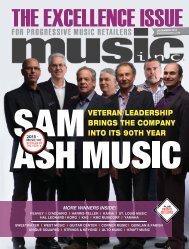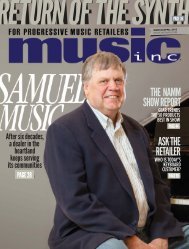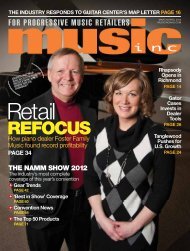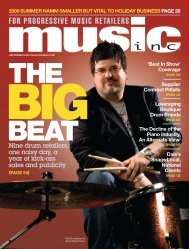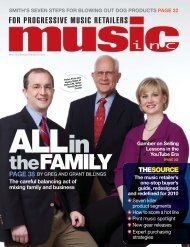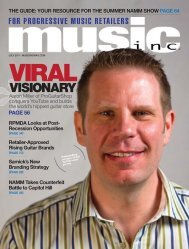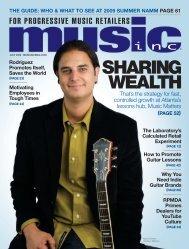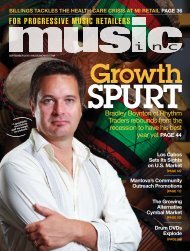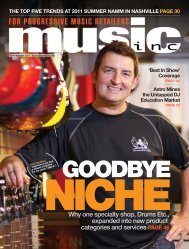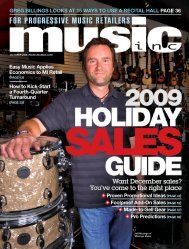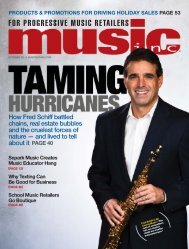BOUTIQUE - Music Inc. Magazine
BOUTIQUE - Music Inc. Magazine
BOUTIQUE - Music Inc. Magazine
You also want an ePaper? Increase the reach of your titles
YUMPU automatically turns print PDFs into web optimized ePapers that Google loves.
InsideSUPPLy<br />
> Two Old Hippies<br />
Acquires Breedlove Guitars<br />
PAgE 26<br />
> St. Louis <strong>Music</strong><br />
Distributes Suzuki in the States<br />
PAgE 27<br />
> Roland<br />
Hosts dealers in Hillsboro, Ore.<br />
PAgE 28<br />
> Diamond Amplification<br />
Gives troops the gift of music<br />
PAgE 30<br />
ManufacTurinG i By ZacH PHilliPS & franK alKyEr<br />
TRADEMARK NIGHTMARE<br />
C.F. Martin executives<br />
got an unwelcome<br />
surprise when they<br />
arrived in Shanghai<br />
for <strong>Music</strong> China<br />
this past October: Another C.F.<br />
Martin had set up shop in the<br />
trade show hall.<br />
The exhibit bore the Martin<br />
& Co. logo, down to the tag line<br />
“Est. 1833,” and featured dead<br />
ringers of several best-selling Martin<br />
guitars. And yet the company<br />
had no relation to C.F. Martin.<br />
“Like many other American<br />
companies, C.F. Martin & Co.<br />
<strong>Inc</strong>. has become the victim of<br />
unauthorized registration of its<br />
traditional trademark and of<br />
counterfeiting of its products in<br />
the People’s Republic of China,”<br />
said a statement C.F. Martin released<br />
after the international<br />
trade show.<br />
But according to Ron Bienstock,<br />
a leading music industry<br />
attorney and partner with<br />
Bienstock & Michael, the Martin<br />
double was within its legal<br />
rights — at least in China.<br />
BranD HiJacKinG<br />
Unlike the United States, which<br />
has a priority trademark filing<br />
system, China has a first-tofile<br />
trademark system (i.e. first<br />
come, first served). In this case,<br />
another company acquired the<br />
Martin trademark in China by<br />
C.F. Martin<br />
deals with legal<br />
‘corporate<br />
identity theft’<br />
in China<br />
filing for it before the Nazareth,<br />
Pa.-based guitar maker.<br />
Attendees at <strong>Music</strong> China<br />
claimed the alternate Martin<br />
booth was run by Gomans Ltd.<br />
of Hong Kong. That said, a Gomans<br />
representative denied having<br />
registered the Martin Guitar<br />
trademark in question. It’s still<br />
unclear who the principles are<br />
that filed it.<br />
Bienstock stressed that this<br />
wasn’t counterfeiting. He called<br />
it “five steps more destructive,<br />
potentially” and likened it to a<br />
company’s brand being hijacked.<br />
“I want to be clear that this<br />
is bigger than [counterfeiting],”<br />
Bienstock said. “Counterfeit is<br />
a company making exact copied<br />
product. This is corporate identity<br />
theft at the highest level in<br />
the music instrument business.<br />
“Some might say, ‘Knockoffs?<br />
We’ve always had that problem.’<br />
No. That’s not exactly the issue<br />
now. This issue is we’re going to<br />
have other brands being registered<br />
in China in this method. That’s<br />
not the way it was. Some companies<br />
were counterfeiting before,<br />
but these are not counterfeits in<br />
China because they’re made under<br />
the Chinese registration.”<br />
C.F. Martin’s statement added<br />
that the company’s legal counsel<br />
has filed a petition with the<br />
China Patent & Trademark Office<br />
to cancel the other trademark.<br />
Still, Bienstock said that China’s<br />
trademark process is “pro-indigenous,<br />
protective from outside<br />
companies.”<br />
“On our national level, this<br />
is really very difficult,” Bienstock<br />
explained. “We have a<br />
very reluctant set of legislators<br />
who don’t want to press China<br />
too hard, considering that we’ve<br />
just borrowed trillions of dollars<br />
from them.<br />
“So, they don’t want to press<br />
them for [intellectual property]<br />
recognition. But in a world<br />
where we make products there<br />
and all we have is our brand, if<br />
they already have the manufacturing,<br />
then if they register the<br />
brand in China, they own the<br />
brand, too.”<br />
GET an iP PorTfolio<br />
Bienstock said he believes this<br />
trend could ultimately cost<br />
companies with half domestic,<br />
half foreign business as much as<br />
a 30-percent drop in sales.<br />
The bottom line: U.S. manufacturers<br />
and suppliers, if they<br />
haven’t already, need to get their<br />
trademarks filed in foreign countries<br />
with first-to-file systems as<br />
soon as possible.<br />
“An intellectual property portfolio<br />
is essential for a branding<br />
world,” Bienstock said. “We need<br />
to own these marks. We need to<br />
protect these marks. If this is not<br />
accomplished in a cohesive plan,<br />
music instrument companies have<br />
to find new brands and marks<br />
and looks.” MI<br />
JANUARY 2011 I MUSIC INC. I 25



